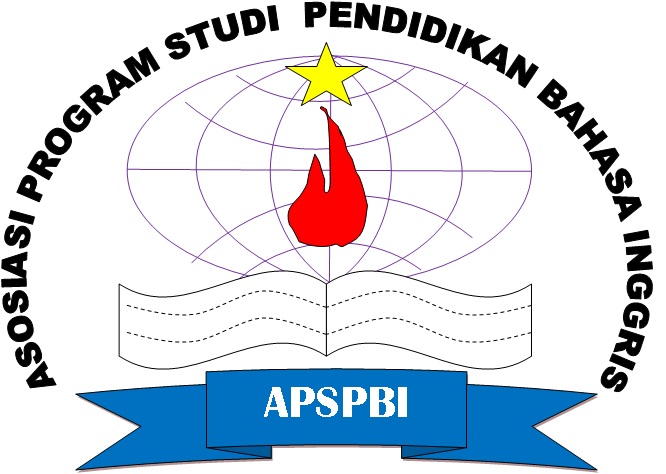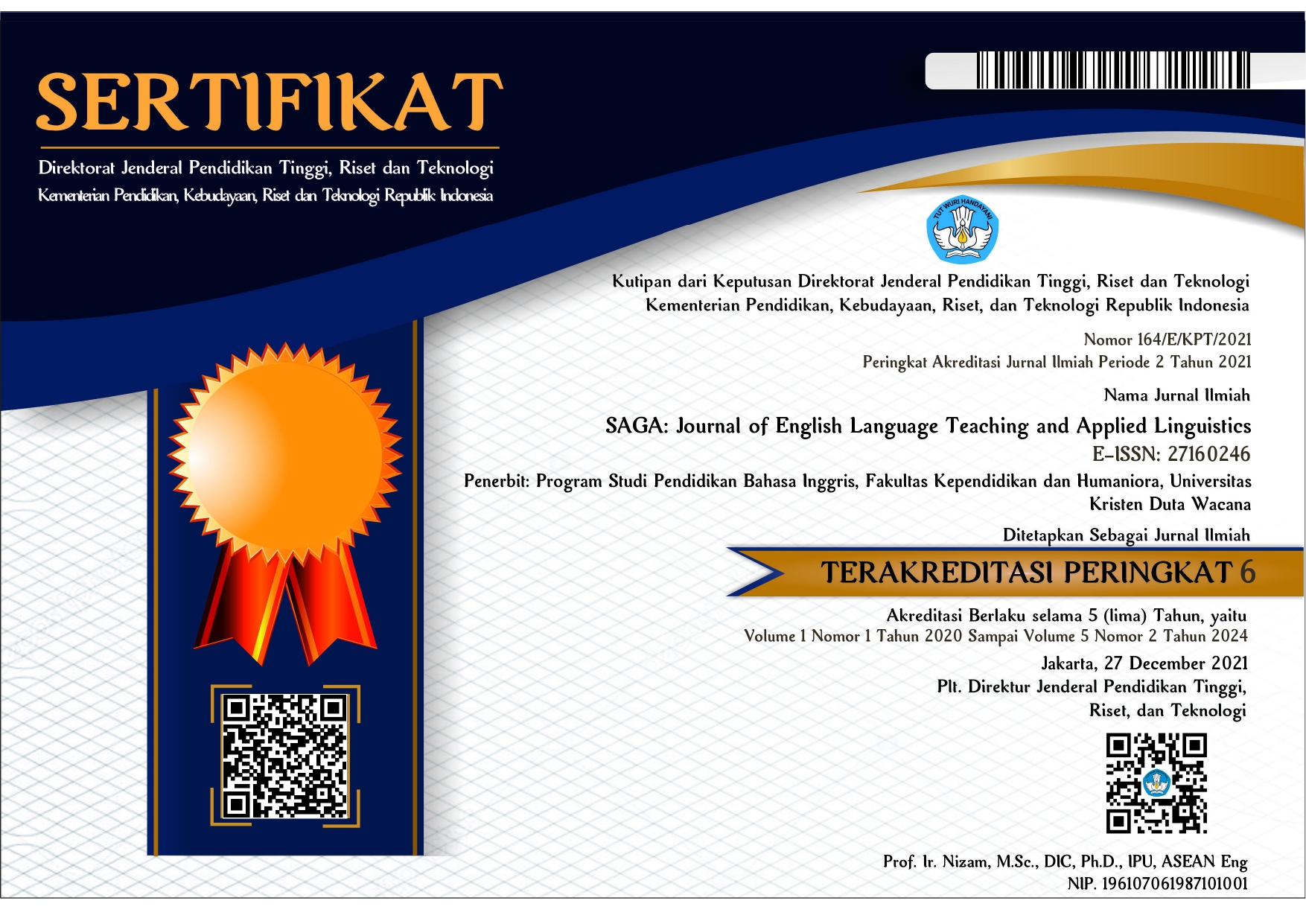Bringing Mall beyond the Wall: Rethinking Online Learning Practices in Indonesian Higher Education
DOI:
https://doi.org/10.21460/saga.2025.61.230Keywords:
online learning, Mobile-related language learning, Self-directed learning, Learning beyond the classroomAbstract
MALL implementation in online learning practice has raised discussion on the possibility of developing learning beyond the classroom. However, online learning circumstances in Indonesia require special attention since this sudden shift of learning methods poses various challenges for teachers and students unfamiliar with this agenda. Therefore, this study reviews related and significant studies on online learning practice in Indonesian higher education. The selected samples were categorized and analyzed to understand the current circumstances of online learning in the Indonesian EFL context and examine the feasibility of learning beyond the classroom (LBC) to be developed in Indonesia. The results indicate that the online learning situation in Indonesia opens a wide opportunity for the development of LBC. Still, several aspects need further consideration and examination to achieve quality English language learning in an online environment. It is recommended for future researchers in the same field to further investigate LBC activities during online learning practice in Indonesia with the help of MALL.
References
Ali, M. M. (2021). The acceptance of mobile-assisted language learning as a primary learning tool for learners in Covid-19 situations. PalArch’s Journal of Archaeology of Egypt/Egyptology, 17(12).
Almadhady, A. A., Rahim, A., Salam, H., & Baharum, H. I. (2021). The use of MALL applications to enhance the English-speaking skills among Arab EFL learners. Psychology and Education Journal, 58(4), 3237–3255.
Alotumi, M. (2020). EFL learning beyond the wall with MALL. In R. Ahmed, A. Al-kadi, & T. Hagar (Eds.), Enhancements and limitations to ICT-based informal language learning: Emerging research and opportunities (138–160). IGI Global Information Science Reference. https://doi.org/10.4018/978-1-7998-2116-8.ch007
Amin, F. M., & Sundari, H. (2020). EFL students’ preferences on digital platforms during emergency remote teaching: Video conference, LMS, or messenger application? Studies in English Language and Education, 7(2), 362–378. https://doi.org/10.24815/siele.v7i2.16929
Ariyanti, A. (2020). EFL students’ challenges towards home learning policy during Covid-19 outbreak. Indonesian Journal of English Language Teaching and Applied Linguistics, 5(1), 167. https://doi.org/10.21093/ijeltal.v5i1.649
Atmojo, A. E. P., & Nugroho, A. (2020). EFL classes must go online! teaching activities and challenges during Covid-19 pandemic in Indonesia. Register Journal, 13(1), 49–76. https://doi.org/10.18326/rgt.v13i1.49-76
Birdsong, D. (2006). Age and second language acquisition and processing: A selective overview. Language Learning, 56(SUPPL. 1), 9–49. https://doi.org/10.1111/J.1467-9922.2006.00353.X
Burston, J. (2014). MALL: The pedagogical challenges. Computer Assisted Language Learning, 27(4), 344–357. https://doi.org/10.1080/09588221.2014.914539
Godwin-Jones, R. (2021). Evolving technologies for language learning. Language Learning and Technology, 25(3), 6–26.
Hermanto, Rai, N. G. M., & Fahmi, A. (2021). Students’ opinions about studying from home during the COVID-19 pandemic in Indonesia. Cypriot Journal of Educational Sciences, 16(2), 499–510. https://doi.org/10.18844/CJES.V16I2.5627
Jeong, K. O. (2018). Developing EFL learners’ communicative competence through multimedia-assisted language learning. Journal of Theoretical and Applied Information Technology, 96(5), 1367–1376.
Krishan, I. A., Ching, H. S., Ramalingam, S., Maruthai, E., Kandasamy, P., Mello, G. De, Munian, S., & Ling, W. W. (2020). Challenges of learning English in the 21st century: online vs. traditional during Covid-19. Malaysian Journal of Social Sciences and Humanities (MJSSH), 5(9), 1–15. https://doi.org/10.47405/mjssh.v5i9.494
Kukulska-hulme, A. (2021). Reflections on research questions in mobile assisted language learning. Journal of China Computer-Assisted Language Learning, 1(1), 28–46. https://doi.org/https://doi.org/10.1515/jccall-2021-2002
Kukulska-Hulme, A., & Viberg, O. (2018). Mobile collaborative language learning: State of the art. British Journal of Educational Technology, 49(2), 207–218. https://doi.org/10.1111/bjet.12580
Kusuma, I. P. I. (2022). EFL teachers’ online teaching in rural schools during the Covid-19 pandemic: Stories from Indonesia. Studies in English Language and Education, 9(1), 203–221. https://doi.org/10.24815/siele.v9i1.21239
Lai, C. S., Au, K. M., & Low, C. S. (2021). Beyond conventional classroom learning: Linking emotions and self-efficacy to academic achievement and satisfaction with online learning during the Covid-19 pandemic. Journal of Education and E-Learning Research, 8(4), 367–374. https://doi.org/10.20448/JOURNAL.509.2021.84.367.374
Laili, R. N., & Nashir, M. (2021). Higher education students' perception on online learning during Covid-19 pandemic. Edukatif: Jurnal Ilmu Pendidikan, 3(3), 689–697. https://doi.org/10.31004/edukatif.v3i3.422
Lusiyani, R., & Dara Anindya, W. (2021). Choosing and using learning media during remote teaching: Teachers' thought. Journal of English Language Teaching and Linguistics, 6(2).
Maulina, M., Nasrullah, R., & Wanci, R. (2022). Social media utilization for self-regulated English learning during Covid-19 outbreaks. Teaching of English Language and Literature Journal, 10(1), 75–83.
Mulyani, Fidyati, Suryani, Suri, M., & Halimatussakdiah. (2021). University students’ perceptions through e-learning implementation during Covid-19 pandemic: Positive or negative features dominate? Studies in English Language and Education, 8(1), 197–211. https://doi.org/10.24815/siele.v8i1.17628
Mutiaraningrum, I., & Nugroho, A. (2021). Smartphone-based mobile-assisted language learning application in higher vocational education in Indonesia. Journal of English Educators Society, 6(1). https://doi.org/10.21070/jees.v6i1.793
Nartiningrum, N., & Nugroho, A. (2020). Online learning amidst global pandemic: EFL students’ challenges, suggestions, and needed materials. English Franca: Academic Journal of English Language and Education, 4(2), 115. https://doi.org/10.29240/ef.v4i2.1494
Nugroho, A., & Atmojo, A. E. P. (2020). Digital learning of English beyond the classroom: EFL learners’ perception and teaching activities. Journal of English Education and Linguistics Studies, 7(2), 219-243, 7(2), 219–243.
Nugroho, A., & Triana, Y. (2021). EFL learners’ beliefs and practices on informal digital learning of English beyond the classroom. Indonesian Journal of English Education, 8(2), 198–212. https://doi.org/10.15408/ijee.v8i2.19843
Omar, S., Shaharuddin, W. Y. W., Nik-Azim, N. A. F., Mohd Nawi, N. S., Zaini, N., & Syahfutra, W. (2021). Academic motivation in English online classes: A comparative study of universities in Malaysia and Indonesia. Indonesian Journal of Applied Linguistics, 11(2), 477–487. https://doi.org/10.17509/ijal.v11i2.34538
Reinders, H. (2021). A framework for learning beyond the classroom. In M. J. Raya & F. Vieira (Eds.), Autonomy in language education: Theory, research and practice. Routledge. https://doi.org/10.4324/9780429261336-6
Reinders, H., & Bailey, K. M. (2021). Assessing and evaluating language learning beyond the classroom. In P. Winke & T. Brunfaut (Eds.), The Routledge handbook of second language acquisition and language testing (pp. 371–381). Routledge. https://doi.org/10.4324/9781351034784-39
Reinders, H., & Benson, P. (2017). Research agenda: Language learning beyond the classroom. Language Teaching, 50(4), 561–578. https://doi.org/https://doi.org/10.1017/S0261444817000192
Rosyada, A. (2020). Promoting learning from home environments through Google Classroom application for EFL undergraduates. Deiksis, 12(03), 229. https://doi.org/10.30998/deiksis.v12i03.6402
Rosyada, A., & Sundari, H. (2021). Learning from home environment: Academic writing course for EFL undergraduates through Google Classroom application. Studies in English Language and Education, 8(2), 710–725. https://doi.org/10.24815/siele.v8i2.18374
Sakkir, G., Dollah, S., Arsyad, S., & Ahmad, J. (2021). Need analysis for developing writing skill materials using Facebook for English undergraduate students. International Journal of Language Education, 5(1), 542–551. https://doi.org/10.26858/ijole.v5i1.14856
Santoso, M. N. (2021). Utilizing a Facebook closed group for EFL e-learning environment: Students’ views. Studies in English Language and Education, 8(3), 1026–1044. https://doi.org/10.24815/siele.v8i3.21233
Shadiev, R., Hwang, W. Y., & Liu, T. Y. (2018). Investigating the effectiveness of a learning activity supported by a mobile multimedia learning system to enhance autonomous EFL learning in authentic contexts. Educational Technology Research and Development, 66(4), 893–912. https://doi.org/10.1007/s11423-018-9590-1
Shanthi, A., & Jaafar, Z. (2020). Beyond classroom English activities to generate interest in English among tertiary students. Asian Journal of University Education, 16(4), 1–9. https://doi.org/10.24191/ajue.v16i4.11928
Shariffuddin, S. A., Wan Shaaidi, W. R., & Hashim, S. M. (2017). Social networks as instructional tools beyond a classroom. International Journal of Advanced and Applied Sciences, 4(12), 185–192. https://doi.org/httpss://doi.org/10.21833/ijaas.2017.012.033
Solihin. (2021). Using mobile-assisted language learning (MALL) to teach English in Indonesian context: opportunities and challenges. Voices of English Language Education Society, 5(2), 95–106. https://doi.org/http://dx.doi.org/10.29408/veles.v5i2.3150
Stockwell, G. (2013). Mobile-assisted language learning. In M. Thomas, H. Reinders, & M. Warschauer (Eds.), Contemporary computer assisted language learning (pp. 201–216). Bloomsburry.
Subekti, A. S., & Kurniawati, L. A. (2022). Indonesian high school English teachers’ attitudes towards the use of instructional technology during the Covid-19 pandemic, Jurnal Iqra’ : Kajian Ilmu Pendidikan, 7(2), 76–88. https://doi.org/10.25217/ji.v7i2.2394.
Syafryadin, Suherdi, D., Nadya, N. L., Harahap, A., & Astrid, A. (2022). Teacher readiness and challenges in creating learner autonomy in ICT-based English learning activities. Indonesian Journal of Applied Linguistics, 11(3), 708–717. https://doi.org/10.17509/ijal.v11i3.34667
Tragant, E., Pinyana, À., Mackay, J., & Andria, M. (2021). Extending language learning beyond the EFL classroom through WhatsApp. Computer Assisted Language Learning, 1(30). https://doi.org/10.1080/09588221.2020.1854310
Viberg, O., & Kukulska-Hulme, A. (2022). Fostering learners’ self-regulation and collaboration skills and strategies for mobile language learning beyond the classroom. In H. Reinders, C. Lai, & P. Shundqvist (Eds.), Routledge handbook of language teaching and learning beyond the classroom. Routledge.
Zeng, S. (2018). English learning in the digital age: Agency, technology and context. Springer Nature Singapore Pte Ltd. https://doi.org/10.4324/9780203875919-9
















